Mulch vs. Compost: Understanding the Differences and Uses
- January 5, 2024
- 0 comment
With a deep-rooted passion for gardening, I’ve consistently found myself captivated by the intricate dynamics of soil health and its profound impact on the vitality of my plants. Among the myriad decisions that often puzzle gardeners, the choice between mulch and compost stands out. While both are lauded as indispensable elements for fostering a flourishing garden, delving into the nuances of their disparities and pinpointing their optimal applications is paramount. Join me as we navigate the realms of mulch and compost, peeling back the layers of mystery to empower you in making well-informed decisions for your verdant sanctuary.
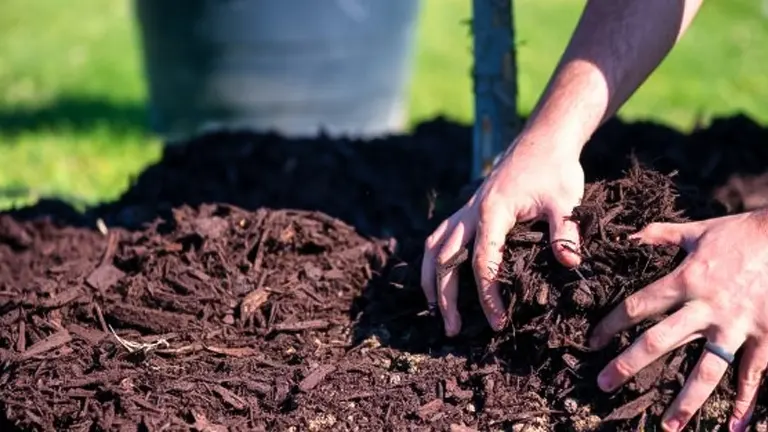
Mulch and compost, both categorized as organic layers aimed at enhancing soil quality, exhibit distinctions that contribute to their respective advantages and disadvantages. If you’re curious about the specifics of their disparities and their roles in a garden, let’s delve into the intricacies of mulching and composting.
Mulching and composting aren’t one-size-fits-all solutions; each has its unique merits and drawbacks. To demystify their functionalities in gardening, we’ll explore the nuances of both practices.
For those seeking a smoother gardening experience, we’ve also compiled reviews of the finest manual lawn aerators to facilitate lawn care endeavors.
List of Mulch vs. Compost: Understanding the Differences and Uses:
- Mulch: The Protective Blanket
- Disadvantages of Mulching
- Advantages of Mulching
- Explore Our Top Recommendations To Help You Create The Optimal Setup
- Advantages Composting
- Disadvantages of Composting
- Using Compost As Mulch
- Benefits of Using Compost
What is Mulching in Agriculture?
Mulching involves the application of organic matter onto the soil surface, essentially acting as a protective blanket for the soil beneath. The composition of mulch primarily consists of fallen leaves, foliage, and dried grass, constituting an organic layer that not only improves soil fertility but also serves various other functions.
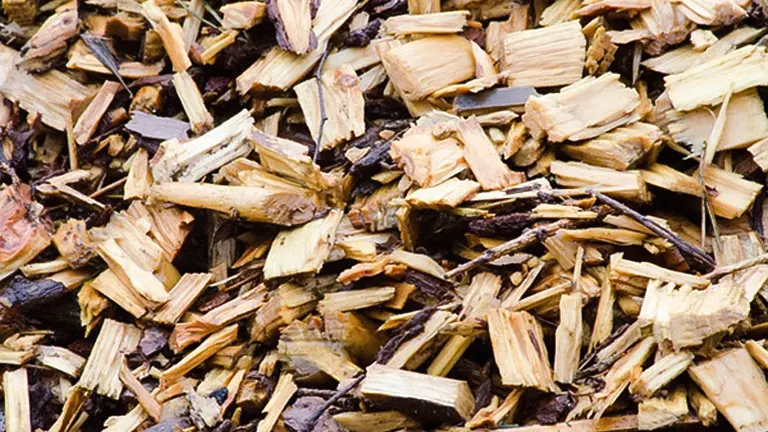
While there are different types of mulch available, when utilized effectively, it can prove highly advantageous for any garden. However, it’s essential to be mindful of its potential drawbacks, ensuring a well-informed approach to maximize its benefits in your gardening endeavors.
1. Mulch: The Protective Blanket
Mulch is like a cozy blanket for your garden soil. It’s a layer of material spread on the soil surface, providing a range of benefits that extend beyond mere aesthetics. One of its primary roles is temperature regulation, keeping the soil cool in the scorching heat and warm during colder spells.
As I spread a layer of mulch around my plants, I can almost feel the soil thanking me for shielding it from the extremes of weather. But mulch isn’t just about temperature control; it also suppresses weeds, preventing them from stealing precious nutrients and sunlight from my plants. Additionally, mulch helps retain soil moisture by reducing evaporation, which means less frequent watering – a game-changer for those of us with busy schedules.
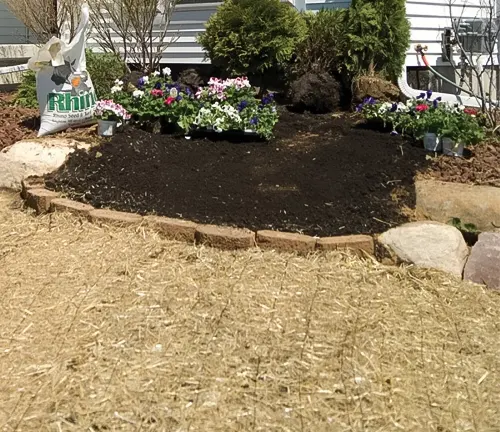
2. Disadvantages of Mulching
While mulching offers numerous benefits for gardens, it is crucial to consider its potential disadvantages. One notable drawback is the risk of over-mulching, where an excessive layer of mulch can lead to waterlogging, inhibiting proper aeration and root development. Additionally, if the mulch is not adequately decomposed, it may temporarily tie up nitrogen in the soil during the decomposition process, potentially affecting nutrient availability for plants.
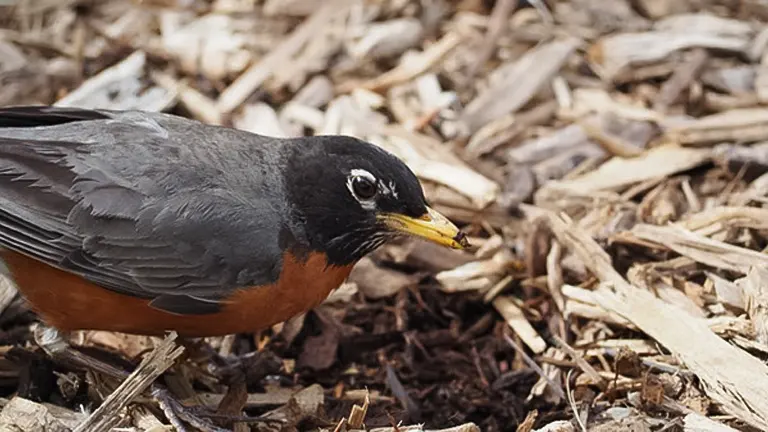
Moreover, certain types of mulch, like wood chips, can harbor pests or provide a habitat for diseases, posing a threat to plant health. Therefore, maintaining a balanced and mindful approach to mulching is essential to harness its advantages without falling prey to its potential drawbacks.
- Cost Considerations: The expense associated with mulching can be a significant factor, especially for larger gardens. The size of the outdoor area influences the amount of work and quantity of mulch required, leading to potential cost overruns.
- Pest Challenges: The use of mulch often brings with it the challenge of pests. The organic matter in mulch creates an ideal breeding ground for various species and diseases that can pose threats to your plants. Vigilance is required to manage and mitigate potential pest-related issues in mulched areas.
- Mulch Quality: The condition of the organic material used as mulch is paramount. Applying mulch when it is in poor condition can pose potential risks to all the plants in your garden. Mulches are typically recommended in the early stages of decomposition or when they maintain a loose structure to ensure optimal benefits without jeopardizing plant health.
3. Advantages of Mulching
Embracing mulching in your gardening routine offers a multitude of advantages, enhancing the overall health and productivity of your plants. One notable benefit lies in moisture retention. By providing a protective layer on the soil surface, mulch acts as a barrier against moisture evaporation, ensuring that the soil retains its hydration levels for a longer duration.
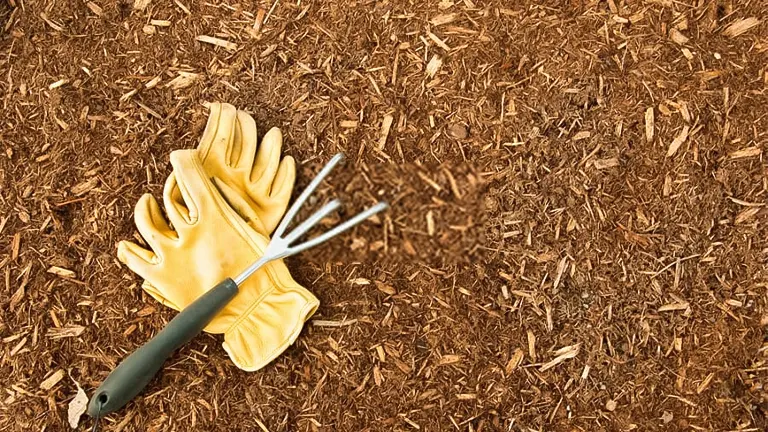
This proves especially beneficial during hot and dry periods, as the mulch helps create a more stable and consistent environment for plant roots, reducing the need for frequent watering. Additionally, the insulation provided by mulch contributes to temperature regulation, shielding the soil from extreme weather conditions and promoting an optimal environment for plant growth. In essence, incorporating mulching into your gardening practices not only conserves water but also fosters a resilient and thriving garden ecosystem.
- Manages Weed Growth: Dealing with invasive weeds is a common challenge in gardening, and their uncontrolled growth can impede the healthy development of your plants. Weeds have the tendency to absorb essential nutrients from the soil, depriving your plants of the sustenance they require for optimal growth. Moreover, if weeds surpass the height of your cultivated crops, they can cast shadows, obstructing sunlight and ultimately leading to the demise of your plants. To counteract these threats, mulch emerges as an effective weed control measure when traditional organic weed killers may fall short. Mulch is renowned for its weed-suppressing qualities, acting as a natural weed barrier that denies them the sunlight crucial for their growth. Utilizing mulch strategically becomes a poetic justice of sorts, ensuring your plants receive the nutrients and sunlight they need for flourishing growth.
- Provides Nutrients: Mulching stands out as an exceptional source of nutrients for your soil. The application of organic matter enriches the soil with a diverse array of elements essential for the well-being of your plants. This infusion of nutrients fosters robust plant growth and contributes significantly to their overall health. Furthermore, mulch plays a pivotal role in enhancing soil fertility, an especially crucial aspect when cultivating crops. The cumulative effect is a visually stunning array of plants gracing your outdoor space, a testament to the nutrient-rich environment fostered by judicious mulching practices.
- Controls Temperature and Retains Moisture: One of the paramount advantages of organic mulch is its unparalleled ability to retain moisture. By acting as a protective layer over the soil, mulch prevents excessive heating from the sun, ensuring that water doesn’t evaporate rapidly. This, in turn, allows plants to access water for extended periods, promoting sustained growth and reducing the frequency of irrigation. Beyond moisture retention, mulch also serves as a temperature regulator for the soil. It acts as a natural insulator, keeping the soil cool during hot weather and providing warmth during colder days. This dynamic control over temperature creates an optimal environment for plant roots, contributing to their resilience and overall vitality.
What is Composting?
Decomposed organic matter, whether through natural processes or assisted by a shredder, constitutes the essence of composting. This method emerges as a remarkable means to enrich the fertility of your garden soil. A well-managed compost pile predominantly comprises plant-based materials and food scraps, meticulously arranged in alternating layers of green and brown.
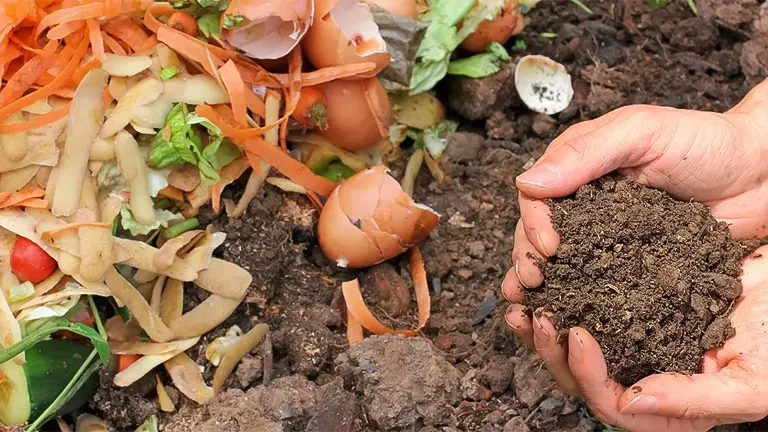
Achieving an effective composting process can be facilitated by reading insightful shredder reviews before selecting a suitable device. Beyond its role in garden nourishment, composting proves to be a sustainable strategy for reducing food waste at home. Virtually all food remnants, irrespective of whether you have a sprawling backyard or engage in container gardening, can be repurposed to contribute to the health and vitality of your garden.
Explore Our Top Recommendations To Help You Create The Optimal Setup:
- Discover the finest containers for trees and shrubs, explore the best indoor planters, and find the most suitable planters for small gardens.
- For flower enthusiasts, don’t miss out on our selection of the 5 best planters designed specifically for vibrant floral displays.
- Delve into our findings for the best planters tailored for growing vegetables, ensuring your vegetable garden thrives with the right containers.
It’s important to note that certain items, such as meat, dairy products, animal waste, and bones, are not the most compost-friendly materials.
Distinguishing compost from mulch lies in its application method. According to experts, compost is considered an organic matter that is incorporated into the soil, unlike mulch, which is typically spread on top of the soil surface.
4. Advantages Composting
Engaging in composting offers a myriad of benefits for both the environment and your garden. One significant advantage lies in the enhancement of soil fertility. Compost, rich in organic matter derived from decomposed plant materials and food scraps, introduces a wealth of essential nutrients to the soil. As the compost integrates with the earth, it promotes a robust microbial environment, fostering the growth of beneficial bacteria and fungi.
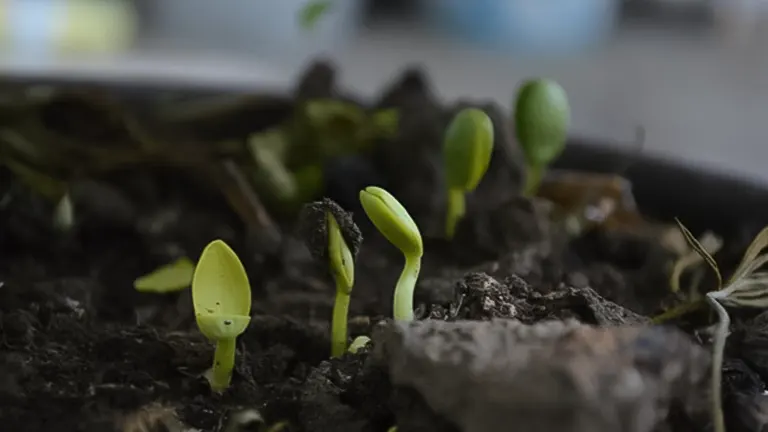
This thriving ecosystem not only contributes to nutrient availability but also improves soil structure, enhancing water retention and aeration. The result is a nutrient-rich soil that provides an optimal foundation for plant growth, leading to healthier, more resilient plants in your garden. Embracing composting is not just a sustainable waste management practice but a transformative way to nurture and fortify the health of your garden ecosystem.
- Promotes Plant Thriving: Incorporating compost into your garden soil enriches it with a wealth of essential nutrients, providing a sustained source for plant growth. The nutrients present in the compost remain accessible to plants over an extended period, ensuring they can absorb them as needed. This extended availability of nutrients stands as a primary and invaluable advantage of composting, fostering a thriving environment for your plants.
- Improves Soil Well-Being: Beyond its nutrient-rich qualities, composting contributes significantly to enhancing overall soil health. Acting as a natural fertilizer, compost not only augments soil quality but also acts as a cleansing agent, preventing erosion. The resulting nutrient-rich soil creates an ideal foundation for successful plant and flower growth, promoting their overall health and vitality.
- Eco-Friendly Recycling: Crafting your compost presents an eco-friendly avenue to reduce food waste while repurposing various leftovers that might otherwise be discarded, such as tea bags, coffee grounds, produce peels, eggshells, and grass. These components, forming the green layer in a compost pile, showcase the recycling-friendly nature of composting. Moreover, the composting process accommodates a wide range of materials, including dead leaves and wood pieces (brown layers), providing an extensive list of items suitable for composting. This sustainable approach encourages thoughtful consideration before discarding items, promoting a recycling mindset in waste management.
5. Disadvantages of Composting
While composting is a highly beneficial practice, it does come with certain disadvantages. One notable drawback is the potential for unpleasant odors that may arise during the decomposition process, particularly if the compost pile is not properly managed or aerated. Improperly balanced compost bins can attract pests, such as rodents or insects, posing a challenge in maintaining a clean and pest-free composting environment.
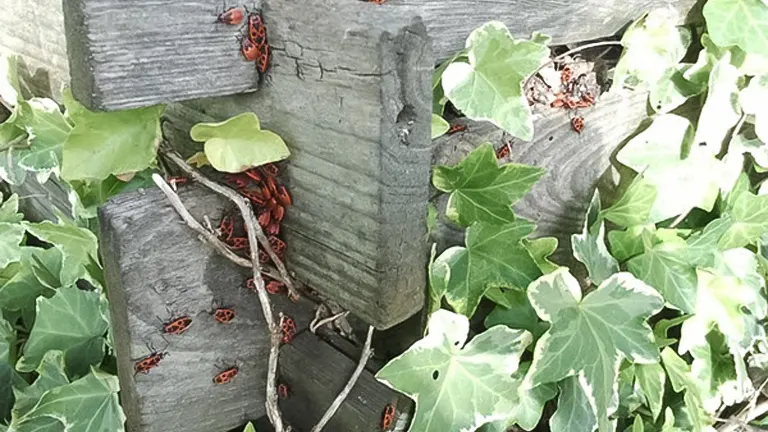
Additionally, achieving the ideal balance between green and brown materials (nitrogen-rich and carbon-rich components) requires attention, as an imbalance may lead to a slow decomposition process or the production of compost that lacks the desired nutrient profile. Therefore, while composting offers substantial advantages, addressing these potential issues ensures a successful and efficient composting experience.
- Unpleasant Odors: A significant drawback associated with composting is the potential release of unpleasant odors during the decomposition process. It’s crucial to consider the duration of composting, which can span several months to a year before the mixture reaches its optimum state. This extended timeline necessitates mindfulness about the potential impact on neighbors. If they are receptive to the occasional odor, the project can proceed. However, the risk of an off-putting smell can attract pests, leading to potential infestations and further complicating the composting experience.
- Labor-Intensive Project: While composting is highly effective for soil fertilization, it demands considerable effort and time before the compost is ready for use. Achieving the desired dark chocolate brown appearance, indicating the organic matter’s readiness requires consistent heating and moisture maintenance. Neglecting these factors may hinder the complete breakdown of ingredients, potentially causing an unpleasant smell and attracting pests, leading to infestations.
- Weather Sensitivity: Successful composting relies on maintaining optimal internal temperatures ranging between 49-77 degrees Celsius (120-170 Fahrenheit). However, this can be challenging, particularly during colder months. Winter weather poses difficulties in generating the necessary heat, impacting the composting process. Lack of sunlight, which generates heat and aids in breaking down components, can be a hindrance. A potential solution is to store the compost bin indoors during colder seasons, helping mitigate this weather-related challenge in composting.
Compost VS Mulch
The fundamental distinction between compost and mulch lies in their roles and placement in soil enhancement. Compost functions internally, enriching the soil from within, while mulch serves as a protective layer applied strictly on the surface.
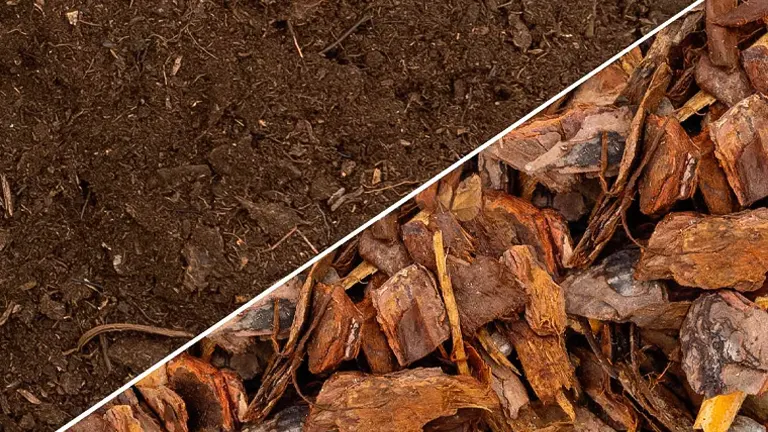
- Compost, renowned for its nutritional benefits, is typically incorporated into garden soil through tilling. This nutrient-rich mixture becomes a source of sustenance for both plants and soil-dwelling organisms. As earthworms create tiny tunnels, feasting on the nutrient-laden compost, the soil becomes looser, allowing roots to thrive and spread.
- In contrast, mulch is applied to the top layer of the garden to regulate temperatures and retain moisture. Whether it’s straw, leaves, or wood chips, mulch acts as a protective barrier that also inhibits weed growth. Similar to compost, mulch contributes beneficial components to the soil, albeit in lesser quantities. However, mulch decomposes over time, requiring periodic replenishment to maintain its effectiveness.
| Aspect | Compost | Mulch |
|---|---|---|
| Purpose | Soil enrichment and fertility | Surface protection, weed suppression, and moisture retention |
| Composition | Decomposed organic matter | Varied organic materials, often less decomposed |
| Nutrient Content | Rich in diverse nutrients | Provides some nutrients, but less concentrated compared to compost |
| Application | Mixed into the soil | Applied on the soil surface |
| Effect on Soil Structure | Improves structure and water retention | Forms a protective layer, can enhance soil structure as it decomposes |
| Decomposition Time | Several months to a year | Varied, may require occasional replenishment |
| Usage Frequency | Applied periodically for nutrient boost | Regularly used for maintaining soil health and moisture |
| Weed Control | Limited weed suppression | Effective weed control by preventing sunlight exposure |
| Odor | Minimal odor when well-managed | Odor may arise, especially during decomposition |
| Pest Attraction | Generally less attractive to pests | May attract pests if not managed properly |
| Cost | May involve initial setup costs | Can be more cost-effective for large areas |
6. Using Compost As Mulch
Using compost for garden mulch gives you all of the benefits of standard, non-organic mulches with the added benefit of nutrients being constantly leached into the soil beneath it. As rainwater or irrigation water runs through the layer of compost, micro-doses of nitrogen and carbon are washed downward, improving the soil in the process.
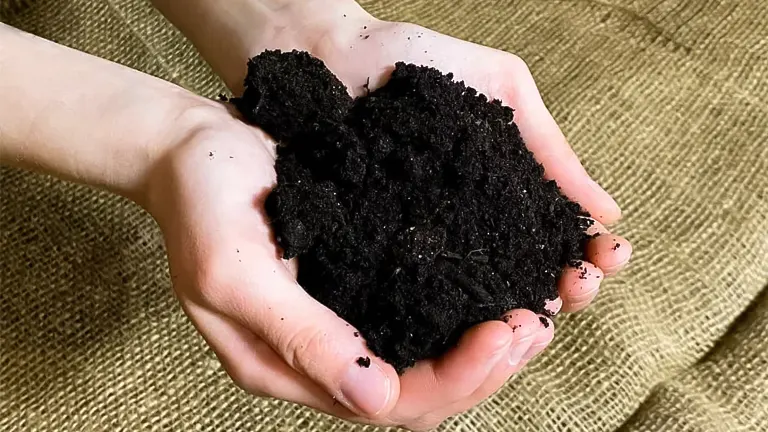
As with other mulch mediums, a thicker layer is better to help shade out sunlight from potential weeds. A two to four-inch layer of compost should be added over your soil around all of your perennials, extending out a foot around each plant. As the compost will slowly work its way into the soil below during the growing season, you will want to add additional layers every month or so during the summer and fall.
Using compost as mulch will enrich your soil but keep in mind that whenever any kind of mulch is dry, it’s not a great environment for plant roots. Another way to use compost as mulch is to spread a thin layer around plants and to top it with another mulch, such as chopped leaves, or wood chips. This will keep compost moist and biologically active, providing the best possible benefit for your garden’s plants.
7. Benefits of Using Compost
Using compost to fertilize your garden provides more nutrients near the roots of your plants, This makes for easier absorption of nutrients and in turn, more vigorous growth and stronger plants. The nutrients in compost are densely packed and are released into the soil over a long period. Many months, sometimes even years down the road, your plants will still be able to thrive in the nutrient-enriched soil.
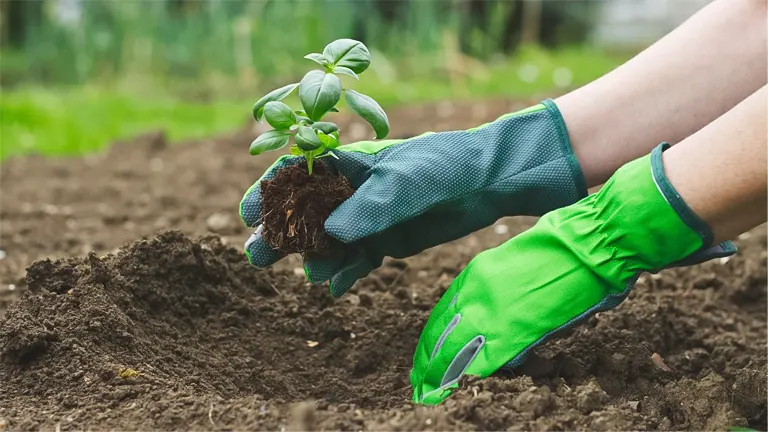
Regular household items that would otherwise be discarded as trash, can be used as compost and repurposed to create a wonderful soil booster. Items from the kitchen such as used paper towels, egg shells, fruit peels, tea bags, and more can be tossed into the compost heap.
Other household items like cotton balls, human and animal hair, and pencil shavings can also be thrown into the compost pile to break down. Repurposing used household items cuts down on your carbon footprint and saves you some wear and tear on your back by reducing the amount of time you spend taking out trash and cutting down the weight of the trash itself.
Related Articles:
- Maximizing Garden Health: A Step-by-Step Guide to Using Leaf Mulch
- Leaf Mold: Nature’s Gift to Gardeners
- Top 5 Reasons Why Mulching Is Essential for Your Garden
- Exploring Different Organic Mulch Options for Your Garden
- Benefits of Leaf Mulching
Final Thoughts
In conclusion, the use of both mulch and compost proves instrumental in supplying your plants with essential nutrients for optimal growth. Beyond nourishing your plants, these organic materials play a pivotal role in enhancing the overall health and quality of your garden soil. Embracing natural fertilizers like mulch and compost not only benefits your plants but also presents a sustainable alternative to the use of various chemicals in crop cultivation.
This eco-friendly approach not only contributes to the well-being of your garden but also helps in cost savings by reducing reliance on chemical fertilizers. We trust that this article has provided clarity on the distinctions between mulch and compost, empowering you to make informed decisions for the flourishing health of your garden.
Frequently Asked Questions
- What is the primary purpose of mulch in a garden?
Mulch primarily serves as a protective layer on the soil surface, providing insulation, weed suppression, and moisture retention. - How does compost contribute to soil fertility?
Compost enriches the soil by providing a diverse array of nutrients through decomposed organic matter, promoting healthier plant growth. - Can mulch be used as a fertilizer like compost?
While mulch does release nutrients into the soil as it decomposes, it generally does not offer the same concentrated nutrient content as compost. - What are the disadvantages of over-mulching?
Over-mulching can lead to waterlogging, inhibiting proper aeration and root development, and potentially causing harm to plants. - How long does it take for compost to be ready for use in the garden?
The composting process typically takes several months to a year, depending on factors such as materials used, size of the compost pile, and management practices. - What are the common materials used for mulching?
Mulch materials include straws, leaves, wood chips, and various organic materials that form a protective layer on the soil. - Can compost attract pests or cause odors?
If not properly managed, compost can attract pests and emit unpleasant odors during the decomposition process. - What’s the ideal ratio of green to brown materials in composting?
A balanced compost pile typically consists of a mix of green (nitrogen-rich) and brown (carbon-rich) materials in a ratio that promotes efficient decomposition. - Is composting suitable for all types of gardens, including container gardening?
Composting can be adapted to various garden sizes, including container gardening, offering benefits like improved soil structure and nutrient content. - How does mulch help control soil temperature?
Mulch acts as an insulator, regulating soil temperature by keeping it cooler in hot weather and warmer during colder days, providing an optimal environment for plant roots.
Your gardening journey matters to us! Feel free to share your experiences and thoughts on Mulch vs. Compost in the comments below. Your valuable insights could be the guiding light for fellow gardeners, helping them make informed decisions in nurturing their green havens!

Edward Smith
Forestry AuthorWoodworking is about more than crafting; it's a harmonious connection with nature, mastering tools, and preserving our environment. I'm here to share my knowledge and experiences with you, forging a future where we can embrace wood's beauty and utility while safeguarding our forests' health and diversity.

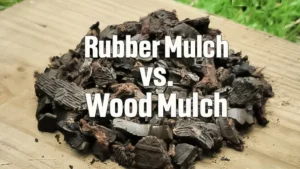
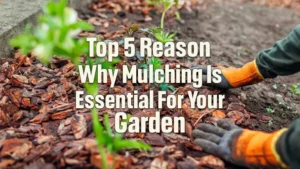
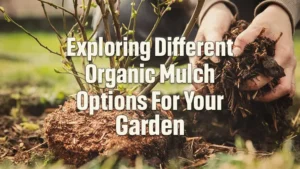
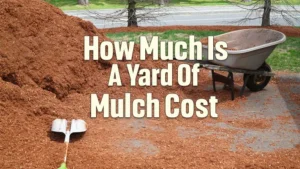
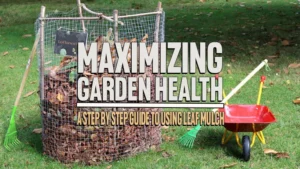
Leave your comment